人教版PEP五年级英语(下册)复习提纲(超全)
人教版PEP五年级英语下册第三单元知识点、练习(含答案)
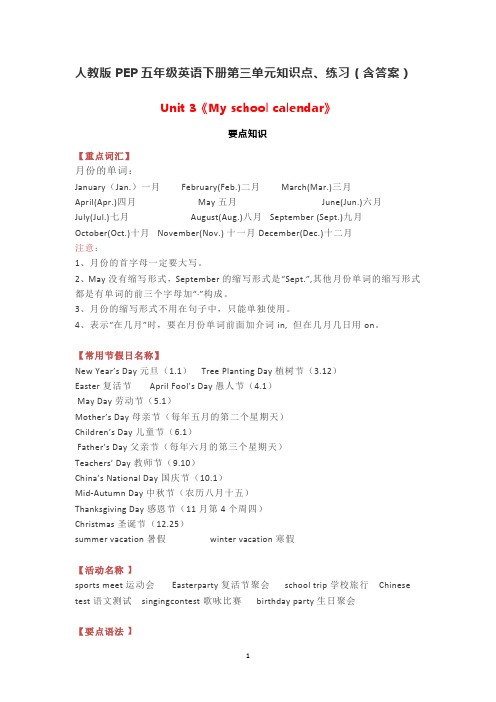
人教版PEP五年级英语下册第三单元知识点、练习(含答案)Unit 3《My school calendar》要点知识【重点词汇】月份的单词:January(Jan.)一月February(Feb.)二月March(Mar.)三月April(Apr.)四月 May五月June(Jun.)六月July(Jul.)七月August(Aug.)八月 September (Sept.)九月October(Oct.)十月 November(Nov.) 十一月 December(Dec.)十二月注意:1、月份的首字母一定要大写。
2、May没有缩写形式,September的缩写形式是“Sept.”,其他月份单词的缩写形式都是有单词的前三个字母加“·”构成。
3、月份的缩写形式不用在句子中,只能单独使用。
4、表示“在几月”时,要在月份单词前面加介词in, 但在几月几日用on。
【常用节假日名称】New Year’s Day元旦(1.1) Tree Planting Day 植树节(3.12)Easter 复活节April Fool’s Day愚人节(4.1)May Day 劳动节(5.1)Mother’s Day母亲节(每年五月的第二个星期天)Children’s Day儿童节(6.1)Father’s Day父亲节(每年六月的第三个星期天)Teachers’ Day教师节(9.10)China’s National Day国庆节(10.1)Mid-Autumn Day 中秋节(农历八月十五)Thanksgiving Day 感恩节(11月第4个周四)Christmas圣诞节(12.25)summer vacation暑假winter vacation寒假【活动名称】sports meet 运动会 Easterparty 复活节聚会 school trip 学校旅行 Chinese test 语文测试 singingcontest歌咏比赛 birthday party生日聚会【要点语法】1. 介词in 、on、at的用法。
PEP五下复习提纲

PEP五下英语复习导学
(阶段目标)
第一轮复习计划 6.5—6.11
1、总词表单词词词过关,听写、订正;
2、U6、U5、U4重点课文(至少六篇)会背会默,订正;
3、每日整理基础训练,完成。
4、请根据阶段总目标制定日复习目标,家长签字。
第二轮复习计划 6.12—6.19
1、U1、U
2、U
3、U
4、U
5、U6重点课文会背会默,批改、签字;
2、每单元讲义(全册书)小词部分理解并完全掌握;
3、整理复习单元测试错题、基础训练错题和其他练习错题。
4、(提高)熟练掌握否定句、肯定句、一般疑问句、特殊疑问句、单数
句、复数句的转换,了解一般现在时、一般将来时和现在进行时的结构,并会相互转换。
五年级下册英语提纲

五年级下册英语提纲1. Unit 1: My School Life- Introduction to the school and classroom vocabulary- Describing daily routines and activities at school- Talking about subjects, teachers, and school facilities- Discussing likes and dislikes about school- Writing a short paragraph about a typical day at school2. Unit 2: My Family and Friends- Identifying family members and relationships- Describing physical appearance and personalities- Talking about likes and dislikes of family members- Discussing hobbies and interests with friends- Writing a paragraph about a family member or friend3. Unit 3: Let's Travel- Learning vocabulary related to travel and transportation- Discussing different means of transportation- Talking about past trips and experiences- Giving directions and discussing places to visit- Writing a short passage about a favorite vacation4. Unit 4: At the Restaurant- Learning food-related vocabulary and expressions- Ordering food and drinks at a restaurant- Discussing preferences and dietary restrictions- Understanding and using polite language in a restaurant setting - Writing a dialogue between a customer and a waiter5. Unit 5: Nature and Environment- Identifying different animals and plants- Discussing habitats and ecosystems- Talking about environmental issues and conservation- Describing weather conditions and seasons- Writing a paragraph about a favorite animal or plant6. Unit 6: Celebrations Around the World- Learning about different cultural celebrations- Discussing traditional customs and rituals- Talking about special occasions and festivals- Comparing and contrasting celebrations from different countries- Writing a short report about a specific cultural celebration7. Unit 7: Let's Play Sports- Learning sports-related vocabulary and expressions- Discussing favorite sports and athletes- Talking about rules and strategies in different sports- Describing personal achievements and experiences in sports- Writing a paragraph about a favorite sport or athlete8. Unit 8: Art and Music- Learning vocabulary related to art and music- Discussing different forms of art and musical instruments- Talking about favorite artists and musicians- Describing personal experiences with art and music- Writing a short paragraph about a favorite artwork or song9. Unit 9: Our World, Our Responsibility- Understanding the importance of environmental conservation- Discussing ways to protect the environment- Talking about recycling and reducing waste- Exploring renewable energy sources- Writing a persuasive essay about the importance of taking care of the environment10. Unit 10: Review and Assessment- Reviewing vocabulary, grammar, and concepts from the previous units- Practicing listening, speaking, reading, and writing skills- Completing assessments to evaluate learning progress- Reflecting on personal growth and achievements in English- Writing a reflection about the overall learning experience in the fifth grade English class.11. Unit 11: Technology and Innovation- Learning vocabulary related to technology and innovation- Discussing the benefits and challenges of technology in our lives- Talking about different types of technology and their uses- Describing how technology has changed the way we live and work- Writing a paragraph about a favorite technological innovation12. Unit 12: Careers and Hobbies- Learning vocabulary related to different careers and hobbies- Discussing career aspirations and goals- Talking about the skills and qualifications needed for various professions- Describing the importance of hobbies in our lives- Writing a short passage about a dream job or hobby13. Unit 13: Health and Wellness- Learning vocabulary related to health and wellness- Discussing the importance of maintaining a healthy lifestyle- Talking about different types of exercise and physical activities- Describing the benefits of a balanced diet and proper sleep- Writing a paragraph about a personal health habit or goal14. Unit 14: Safety and First Aid- Learning vocabulary related to safety and first aid- Discussing common safety rules and precautions- Talking about emergency situations and how to respond- Describing basic first aid techniques and procedures- Writing a short passage about a safety tip or first aid skill15. Unit 15: Cultural Exchange- Learning vocabulary related to cultural exchange and diversity- Discussing the importance of cultural understanding and respect- Talking about cultural customs and traditions from different countries - Describing personal experiences with cultural exchange- Writing a short paragraph about a cultural exchange experience16. Unit 16: Public Speaking and Presentation Skills- Learning vocabulary related to public speaking and presentation skills - Discussing the importance of effective communication- Talking about how to prepare and deliver a successful presentation- Describing the use of visual aids and body language in presentations - Writing a script for a short presentation on a topic of interest17. Unit 17: Creative Writing and Storytelling- Learning vocabulary related to creative writing and storytelling- Discussing different types of stories and genres- Talking about story elements such as characters, setting, and plot- Describing the process of writing a story or narrative- Writing a short story or narrative based on a given prompt18. Unit 18: Media Literacy and Critical Thinking- Learning vocabulary related to media literacy and critical thinking- Discussing the importance of being media literate in today's society - Talking about how to analyze and evaluate media messages- Describing the impact of media on our thoughts and behaviors- Writing a short essay on the importance of media literacy and critical thinking19. Unit 19: Time Management and Study Skills- Learning vocabulary related to time management and study skills- Discussing the importance of effective time management- Talking about different study strategies and techniques- Describing personal experiences with time management and study habits - Writing a paragraph about a time management or study skill that works well for you20. Unit 20: Review and Assessment- Reviewing vocabulary, grammar, and concepts from the previous units- Practicing listening, speaking, reading, and writing skills- Completing assessments to evaluate learning progress- Reflecting on personal growth and achievements in English- Writing a reflection about the overall learning experience in the fifth grade English class.。
人教版实用小学英语五年级下册期末复习提纲

P E P小学英语五年级下册期末复习提纲Unit1 This is My Day辅导乐园l 、你能听、说、读、写下面的的单词吗Do morning exercises晨练 eat breakfast吃早饭Have English class上英语课 play sports进行体育活动eat dinner吃晚饭 when什么时候 evening夜晚,晚上get up起床 at在……点钟 usually通常,一般noon中午 weekend周末 often经常climb mountains爬山 go shopping去购物play the piano弹钢琴 visit grandparents探望外祖父母go hiking去远足 sometimes有时候2、你要听、说、认读下面的的单词和短评:work工作 tell告诉,说3、下面的单词和短语要听、说的:about关于;大约 policeman警察 rain下雨either也 next下一个4 、这些难词、难句你都会使用了吗一When do you do morning exercises 你什么时候晨练一I usually do morning exercises at 8:30.我通常在8:30晨练;When do you十动词短语它的回答:I usually\often….或Usually\Sometimes l….一Excuse me.Can l ask you some questions 对不起,打扰了;我可以问你些问题吗它的回答是:Sure.\Certainly \Yes.等等;—What do you do 你是做什么的一I am a policeman.我是—个警察;女警察:policewoman—When do you go to work 你什么时候去工作Go to work:去工作 go to school:上学 go to bed:上床睡觉一I eat dinner at 7:00in the evening我晚上七点钟吃晚饭;In the morning:在早上 at noon在中午In the afternoon:在下午 in the evening:在晚上一Thank you for telling me about your day. 谢谢你告诉我关于你的一天:=What do you do on weekendsWhat do you do on Mondays\Sundays…你星期一/星期日……干什么Iusually\often +动词词组.或者:Usually \Sometimes I ….一Let's go hiking together next Sunday 让我们下个星期日一起去远足;Next:下一个; Together:一起;一How about you =What about you 你呢一That’s fun.那真有趣;一The weather report says it’s going to rain tomorrow;天气报告说明天会下雨;Be going to…一般将来时,意思是“将会,将要,准备”一I can't go to play football in the rain. I can’t go hiking,either.我不能在雨中踢足球,我也不能去远足;Either和too都是“也”的意思;Too用在肯定句,either用在否定句和一般疑问句;Usually l clean my room.I often go hiking,too.一Then come to my home.Let's watch TV together.那么来我家吧;我们一起看电视;Unit 2 My Favourite Season辅导乐园1你能听、说、读、写下面的的单词吗spring春天 summer夏天 fall秋天 winter冬天season季节 which哪一个 best最;极 swim游泳fly kites放风筝 skate滑冰;滑冰鞋 make a snowman堆雪人plant trees植树 why为什么 because因为 sleep睡觉2下面的单词和短语要听、说的:play with…玩…… always总是 leaf树叶复数leavessnow雪 up至北方或北方城市 north北力‘;向北方Halloween万圣节之前夕 Thanksgiving感恩节3这些难词、难句你都会使用了吗一What's your favourite season 你最喜欢哪个季节一Winter.冬天;What's your favourite…你最喜爱的……是什么它的回答:I like….或者直接答出这样东西就可以;What's your favourite animal 你最喜爱的动物是什么’;一What's the weather like in spring 春天的天气怎么样它的回答是:It's….—Which season do you like best = What's your favourite season你最喜爱那一个季节Which:哪———个best:极,最best friend:最好的朋友Which do you like best它的回答:I like…best.或者直接答出这样东西就可以;Which teacher do you like best 你最喜欢哪一个老师Which fruit do you like best 你最喜爱哪一种水果一It's always sunny and cool.天气总是晴朗又凉爽;always:总是,一直;我们学过的这样的词还有:usually:通常,—般;often:经常;sometimes:有时候一I can play with snow.我可以玩雪;一I don’t like winter.It's too cold.我不喜欢冬天,天气太冷了;I don't like….表达自己不喜欢某物;喜欢就用:I like….I like oranges.But l don't like bananas.—Well,in Canada l like fall best.The sky is very blue.The leaves are colourful.哦,在加拿大,我最喜爱秋天;蓝蓝的天空,树叶色彩鲜艳;Well:感叹词,意思是好啦,哦表示吃惊,安心,让步,谈活重新开始,期待,断念等;Leaf:叶子;复数是:leaves.是不规则变化,像这样的名词还有:knife knives :小刀 wifewives:妻子一We go up north.我们上北方;一Winter is beautiful,but it's too cold for me;冬天很美,但对我来说太冷了;一I like swim in the sea.我喜欢在大海里游泳;不同于:I like swimming..这指的是—贯的喜欢,用于一般的叙述,但是like to则指特别的场合或习惯;例如:I like swimming but l don't like to swim the river.我喜欢游泳,但我不喜欢在河卫游泳;一Summer is good,but fall is my favourite season.夏天不错,但我最喜爱秋天;一What would you like to do I like to….你想做什么我想…;一Why do you like spring 你为什么喜欢春天一Because l can plant trees.因为我可以植树;Why do you like…为什么你喜爱…它的回答:Because….Why do you like summer Because l can swim in the lake.为什么你喜欢夏天因为我可以在湖里游泳;Why do you like winter Because l can sleep a long time.为什么你喜欢冬天因为我可以睡很长时间;一“I like summer,”says Zip·Zip说:“我喜欢夏天;”一“Why do you like summer”asks Zoom.Zoom问:“为什么你喜欢夏天;”Unit 3 My Birthday辅导乐园1.你能听、说、读、写下面的的单词吗Jan一月缩写 Feb二月 Mar三月 Apr四月May五月 June六月 July七月 Aug八月Sept九月 Oct十月 Nov 十一月 Dec—十二月birthday生日 uncle叔叔;舅舅 her她的 date 日期2你要听、说、认读下面的的单词和短语:January一月 February二月 March三月 April四月August八月 September九月 October十月November十—月 December十二月 first第— second第二 third第三 fourth第四 fifth第五 eighth第八ninth第九 twelfth第十二 twentieth第二十3下面的单词和短语要听、说的:chart图表 Cousin堂表儿弟;堂表姐妹send寄;发送 e-card电子卡片 able能everyone每个人 then那么4 这些难词、难句你都会使用了吗一Our Cass Birthday Chart我们班的生日表一When is your birthday 你的生日是什么时候一My birthday is in June.我的生日在六月;一How many birthdays are there in January There are…有多少人的生日在一月有…;一Is your birthday in February,too 你的生日也在二月吗这是…—般疑问句;一When is Children’s Day It's in June.儿童节是什么时候在六月;常见的国内外节日还有:Tree-planting Day 植树仃New Year's Day 新年,元旦Army Day 建军节National Day 国庆节Christmas Day 圣诞节Mother's Day 母亲节Father's Day 父亲节Women's Day 妇女节Teachers’Day 教师节一What are you doing,John 约翰,你在干什么一I am making a birthday chart for our family.我正在给我们家做一张生日表;for:为,给;以上两个句子都是现在进行时,表示正在进行或发生的动作;在第四单元会详细讲解;一When is Grandpa's birthday 爷爷什么时候生日某人’s:表示某人的,并且要注意:位于人名或姓氏之前表示亲属关系的词,其开头的字母要大写;例如: ;Uncle Bill's birthday is in June.比尔叔叔的生日在六月;When is Aunt Mary's birthday 玛丽阿姨的生日是什么时候Cousin Alice’s birthday is in April.爱丽丝表姐的生日在四月;一It’s October1,our National Day在十月一日,我们的国庆节;When is your birthday 的回答有多种形式:1.My birthday is in+月份;2.It's in+月份;3.It's 4+月日;有具体月日,不用“in”,或者用“on”也可以;—When is your Independence Day It'sJuly4th.你们的美国独立日是什么时候在七月四日;一Who has a birthday in October 有谁的生日在十月What's the date today 今天几号What day is it today 今天早期几一I am sending Grandma an e-card.现在进行时我正在给奶奶发一张电子卡片;c-card:电子卡片 e-mail:电子邮件一Is her birthday in June 她的生日在六月吗一般疑问句;它的肯定回答是:Yes,she does.否定回答是:No,she doesn’t.一Does she have a computer 她有电脑吗这是She has a computer.的一般疑问句;它的肯定回答是:Yes,she does.否定回答是:No,she doesn't.一Then she won't be able to see the card.那么她不会看到这张—卡;won't=will not:一般将来时的否定形式;—Let's make a birthday card.让我们做一张生卧卡;一Everyone likes to get birthday cards.每个人都喜欢收生日卡;Unit 4 What Are You Doing辅导乐园draw pictures画画 cook inner做饭read books看书 answer the phone接电话listen to music听音乐 clean the room打扫房间write a letter写信 write a E-mail写邮件mom妈妈 grandpa爷爷 study书房2.下面的单诃和短语要听、说的:talk讲话 Children's Center儿童活动中心see you later再见 speak to和……讲话hold on等一下;停住 call打电话3.这些堆诃;难句你都会使用了吗一What are you doing 你正在干什么一I am doing the dishes.我在洗碗碟;现在进行时意义:表示正在进行或发生的动作,常见的搭配有:now,Look Listen它的构成是:beam/are/is +动词的ing形式;例如:I am drawing pictures.我在画画;She is cooking dinner.她在做饭;They are reading books.他们在看书;This is Chen Jie=This is Chen Jie speaking千万不能说成:I am Chen Jie.一Do you want to go to the Children's Center.你想去儿童活动中心吗一What is your father doing 你爸爸在干什么 -一He's writing an e-mail.他在写电子邮件;以上这两句都是现在进行时;一Can l speak to your mom,please 请问,我可以跟你妈妈说吗打电话用语,找某人时说的;例如:Can l speak to your day一Please hold on.请等一下;打电话用语;一There is a call for you.有一个电话找你;一How's every body doing 二How is everyone doing 家里人怎么样一Just fine.很好;一Grandpa is writing a letter.Brother is doing homework.Mom is cooking dinner in the kitchen.爷爷正在写信;哥哥在做功课;妈妈在厨房里做饭;现在进行时;一Can l speak to him\her,please 请问,我可以跟他/她说吗 him/her:他/她宾格一I'm coming Who's that 我来了;谁啊“Who's that'”打电话用语,用来问对方是谁,不能说成:Who are youUnit 5 Look at the Monkeys辅导乐园1 你能听、说、读、写下面的的单词鹏fly飞 jump跳 walk走 run跑swim游泳 kangaroo袋鼠 sleep睡觉 climb爬fight打架 swing荡秋千 drink water喝水2 下面的单词和短语要听、说的:trunk象鼻 climber攀登者3 这些难词、难句你都会使用了吗一Look at the tiger.看这只老虎;一I see them other elephant.我看见了大象妈妈;Look & see的区别:look强调“看”这个动作,后面要跟at搭配;see则强调看到的结果;还要注意的是:mother elephant:象妈妈,不能说成:elephant mother—What is it doing 它在干什么它的回答是:It's+动词的ing形式;这是主语是第三人称单数的现在进行时;例如:It's eating bananas.它在吃香蕉;一Do you see any elephants 你看见一些大象吗一I love elephants.我爱大象;--That elephant is drinking water with is trunk.那只大象用它的象鼻喝水;With:和……一起,用;在这里是“用”的意思;一What are the elephants doing 大象们在干什么一They are drinking.它们在喝水;以上两句是主语是复数的现在进行时;例如:What are they doing They are sleeping.一What do you see I see two elephants.你看见了什么我看见了两只大象;还要注意:What can you see 它的回答是:I can see two elephants.一What a big nature park多大的自然公园啊感叹句;一Here come two big tigers.来了两只老虎;Here comes a bear.来了一只熊;一They are good climbers.它们是攀登能手;Unit 6 A Field Trip辅导乐园1.你能听、说、读、写下面的的单词吗Take pictures照相 watch insects观察昆虫Pick up leaves采摘树口十 do an experiment做实验Catch butterflies捉蝴蝶 count insects数昆虫Collect leaves收集树口十 write a report写报告Play chess捉棋 have a picnic去野餐honey蜂蜜2.你要听、说、认读下面的的单词和短语:have a look看一看3、下面的单词和短语要听、说的:、woods树林 ant蚂蚁 interesting有趣的thing东西;物 him他宾格 leave离开us我们宾格 over there在那边一What is Mike doing' 迈克在干什么一He's watching insects.他在观察昆虫;一They are in the woods.他们在树林里;Woods:树林 in the forest:在森林;--Are they catching butterflies 他们在捉蝴蝶吗这是They are catching butterflies 的一般疑问句;它的肯定回答是:Yes,they are.否定回答是:No,they aren't.一Are you eating lunch 你们在吃午饭吗这是“I am eating lunch.”或者“We are eating lunch.’’的一般疑问句;它的肯定回答是:Yes,I am.\Yes,w乏are.否定回答是:NO,I am not.\NO,we aren't.一What experiment 什么实验这是一个省略句;一What do ants like to eat 蚂蚁喜欢吃什么一Are they eating the honey 它们在吃蜂蜜吗一They likes sweet food.它们喜欢甜食;一I like sweet things,too.Do an experiment on me,please.我也喜欢甜食;请拿我来做实验吧;一Is he taking pictures 他在照相吗这是He is taking pictures.的一般疑问句;它的肯定回答是:Yes,he is.否定回答是:No,he isn't.一Tell him we are leaving告诉他我们走了;一Is she counting insects 她在数昆虫吗这是She is counting insects的一般疑问句;它的肯定回答是:Yes,she is.否定回答是:No,she isn’t.一She's running to us.她正向我们跑来;to:向,往;一She's over there.她在那边;Over there:在那边;here:这里;。
PEP小学英语五年级下册各单元知识重点总结
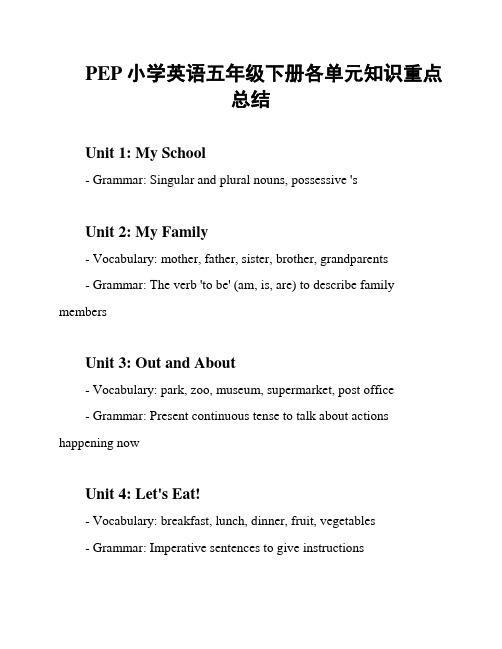
PEP小学英语五年级下册各单元知识重点总结Unit 1: My School- Grammar: Singular and plural nouns, possessive 'sUnit 2: My Family- Vocabulary: mother, father, sister, brother, grandparents- Grammar: The verb 'to be' (am, is, are) to describe family membersUnit 3: Out and About- Vocabulary: park, zoo, museum, supermarket, post office- Grammar: Present continuous tense to talk about actions happening nowUnit 4: Let's Eat!- Vocabulary: breakfast, lunch, dinner, fruit, vegetables- Grammar: Imperative sentences to give instructionsUnit 5: At the Farm- Vocabulary: farmer, barn, cow, pig, chicken- Grammar: There is/There are to talk about existenceUnit 6: Our Town- Vocabulary: street, hospital, police station, fire station, city- Grammar: Prepositions of place (in, on, under, behind, next to)Unit 7: Weather Report- Vocabulary: sunny, cloudy, rainy, snowy, windy- Grammar: Adjectives to describe weatherUnit 8: Fun with Friends- Vocabulary: play, sing, dance, swim, draw- Grammar: Simple present tense to talk about daily activitiesUnit 9: In the Ocean- Vocabulary: fish, dolphin, shark, octopus, seahorse- Grammar: Wh- questions using 'What' and 'Where'Unit 10: Happy Holidays- Vocabulary: Christmas, Easter, Halloween, New Year's Day, Thanksgiving- Grammar: Use of can for ability。
人教版小学五年级英语下册重点知识总览
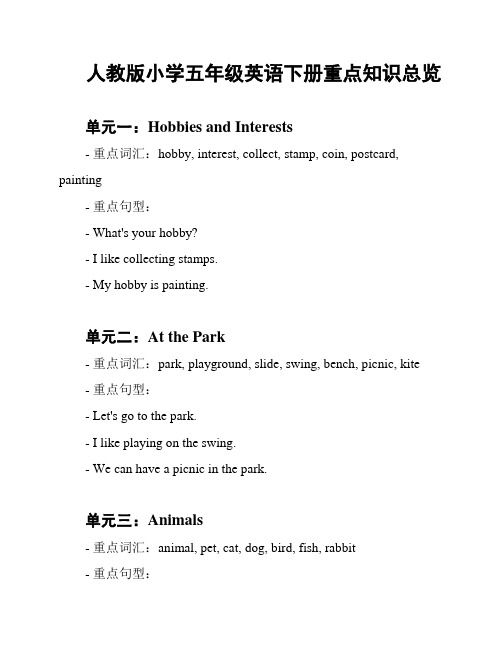
人教版小学五年级英语下册重点知识总览单元一:Hobbies and Interests- 重点词汇:hobby, interest, collect, stamp, coin, postcard, painting- 重点句型:- What's your hobby?- I like collecting stamps.- My hobby is painting.单元二:At the Park- 重点词汇:park, playground, slide, swing, bench, picnic, kite- 重点句型:- Let's go to the park.- I like playing on the swing.- We can have a picnic in the park.单元三:Animals- 重点词汇:animal, pet, cat, dog, bird, fish, rabbit- 重点句型:- Do you have any pets?- I have a pet cat.- The bird is singing.单元四:Food and Drinks- 重点词汇:food, drink, apple, banana, orange, milk, water- 重点句型:- What's your favorite food?- I like eating apples.- Can I have some water?单元五:Weather and Seasons- 重点词汇:weather, sunny, cloudy, rainy, snowy, spring, summer, autumn, winter- 重点句型:- What's the weather like today?- It's sunny and warm.- I like playing in the snow.单元六:My Family- 重点词汇:family, father, mother, brother, sister, grandfather, grandmother- 重点句型:- How many people are there in your family?- I have one brother and one sister.- My grandparents live with us.单元七:School Life- 重点词汇:school, classroom, teacher, student, desk, chair, book, pen- 重点句型:- What's your favorite subject?- I like English.- We study at school.单元八:Sports and Activities- 重点词汇:sports, activity, football, basketball, volleyball, swimming, dancing- 重点句型:- Do you like sports?- Yes, I like playing football.- Let's go swimming together.单元九:Transportation- 重点词汇:transportation, car, bus, bicycle, taxi, train, subway - 重点句型:- How do you go to school?- I go to school by bus.- I want to take a train.单元十:Occupations- 重点词汇:occupation, doctor, teacher, nurse, firefighter, policeman, musician- 重点句型:- What do you want to be in the future?- I want to be a doctor.- My mom is a teacher.以上是人教版小学五年级英语下册的重点知识总览,希望对你有帮助!。
人教版小学五年级英语下册重点知识归类
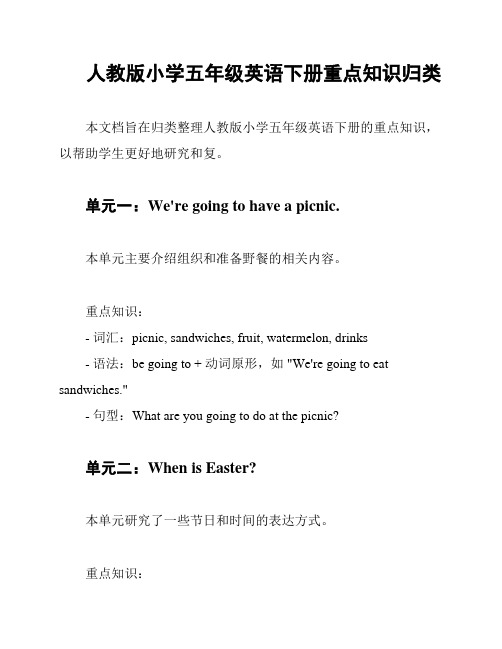
人教版小学五年级英语下册重点知识归类本文档旨在归类整理人教版小学五年级英语下册的重点知识,以帮助学生更好地研究和复。
单元一:We're going to have a picnic.本单元主要介绍组织和准备野餐的相关内容。
重点知识:- 词汇:picnic, sandwiches, fruit, watermelon, drinks- 语法:be going to + 动词原形,如 "We're going to eat sandwiches."- 句型:What are you going to do at the picnic?单元二:When is Easter?本单元研究了一些节日和时间的表达方式。
重点知识:- 词汇:Easter, Christmas, New Year's Day, Halloween- 语法:疑问词when和具体时间的表达,如 "When is Easter?"- 句型:When is Christmas?单元三:Do you want to go to a movie?本单元研究了表达意愿和邀请的相关内容。
重点知识:- 词汇:movie, park, zoo, museum, swimming pool- 语法:do you want to + 动词原形,如 "Do you want to go to a movie?"- 句型:Do you want to go to the park?单元四:Can you swim?本单元介绍了一些体育运动和能力的表达方式。
重点知识:- 词汇:swim, run, jump, skate, ride- 语法:can + 动词原形,如 "Can you swim?"- 句型:Can you ride a bike?单元五:What's the matter with you?本单元主要研究了描述身体状况和感受的表达方式。
人教版PEP英语五年级下册Unit1-My-Day知识点归纳与练习(含答案)
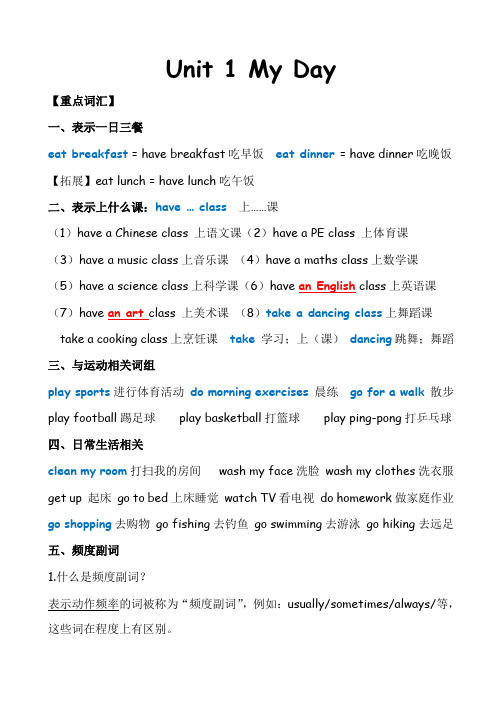
Unit 1 My Day【重点词汇】一、表示一日三餐eat breakfast = have breakfast吃早饭eat dinner= have dinner吃晚饭【拓展】eat lunch = have lunch吃午饭二、表示上什么课:have … class 上……课(1)have a Chinese class 上语文课(2)have a PE class 上体育课(3)have a music class上音乐课(4)have a maths class上数学课(5)have a science class上科学课(6)have an English class上英语课(7)have an art class 上美术课(8)take a dancing class上舞蹈课take a cooking class上烹饪课take学习;上(课)dancing跳舞;舞蹈三、与运动相关词组play sports进行体育活动do morning exercises晨练go for a walk散步play football踢足球play basketball打篮球play ping-pong打乒乓球四、日常生活相关clean my room打扫我的房间wash my face洗脸wash my clothes洗衣服get up 起床go to bed上床睡觉watch TV看电视do homework做家庭作业go shopping去购物go fishing去钓鱼go swimming去游泳go hiking去远足五、频度副词1.什么是频度副词?表示动作频率的词被称为“频度副词”,例如:usually/sometimes/always/等,这些词在程度上有区别。
2.常见频度副词按频率大小排列如下:always(100%)>usually(80%)>often(60%)>sometimes(20%~40%)> never (0%)3.注意频度副词的使用位置:①We usually go to school at seven in the morning.②What do you often do on the weekend?六、常见时间的表达方式1.at + 具体的几点钟;at noon在中午;at night在晚上2.in +月份/季节/早中晚例如:in the morning/afternoon/evening3.关于on表示时间的几种情况:①on + 星期几;②on + 几月几日;③on the weekend在周末;④on Monday morning星期一早上。
人教版PEP小学英语五年级下册知识点汇总(最新)
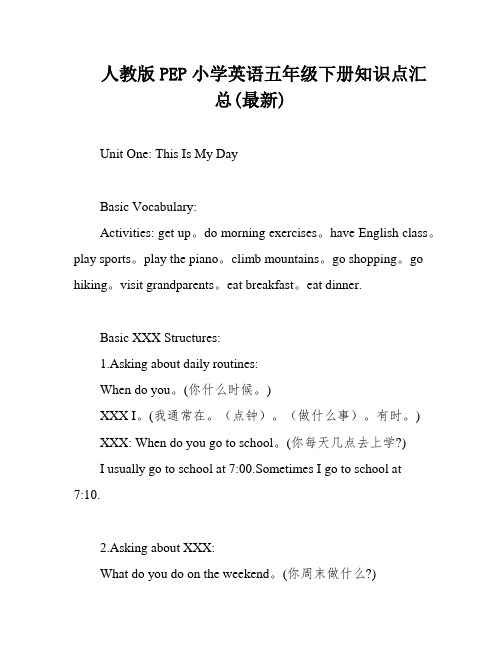
人教版PEP小学英语五年级下册知识点汇总(最新)Unit One: This Is My DayBasic Vocabulary:Activities: get up。
do morning exercises。
have English class。
play sports。
play the piano。
climb mountains。
go shopping。
go hiking。
visit grandparents。
eat breakfast。
eat dinner.Basic XXX Structures:1.Asking about daily routines:When do you。
(你什么时候。
)XXX I。
(我通常在。
(点钟)。
(做什么事)。
有时。
)XXX: When do you go to school。
(你每天几点去上学?)I usually go to school at 7:00.Sometimes I go to school at7:10.2.Asking about XXX:What do you do on the weekend。
(你周末做什么?)XXX I。
(我通常/经常。
有时。
)XXX: What do you do on the weekend?I often play XXX I go shopping with my mom.3.Introducing one's own habits:Every weekend。
I go hiking。
(我每个周末远足。
)Every day。
I do my homework at 8:00 in the evening。
(我每天晚上8点做作业。
)4.Asking XXX:What do you do。
(你是干什么的?)Time:morning。
afternoon。
evening。
noon。
at night。
6:00.on Sunday。
(完整版)人教版PEP英语五年级下学期教学大纲

(完整版)人教版PEP英语五年级下学期教学大纲一、教材分析- 本教材是人教版PEP英语五年级下学期教材,共计10个单元。
- 每个单元都包含了听、说、读、写四个方面的内容。
- 教材注重培养学生的语言综合运用能力,旨在提升学生的英语沟通能力。
二、教学目标1. 能听懂并能流利地复述每个单元中的对话和短文。
2. 能熟练运用所学的单词和句型进行简单的口头表达。
3. 能读懂简单的篇章,理解基本的英语语法规则。
4. 能正确书写所学的英文字母及常用单词。
5. 能进行简单的书面表达,包括个人简介、日常活动等。
三、教学内容与安排1. 听力- 学生通过听录音材料,掌握基本的听力技巧。
- 听懂并模仿对话、短文中的句子与表达方式。
- 听懂并回答与所听内容相关的简单问题。
2. 口语- 学生进行简单的对话练,包括自我介绍、询问与回答日常活动等。
- 学生通过角色扮演的形式,提高口语表达能力。
3. 阅读- 学生通过阅读课文和练题,理解文章中的基本意思。
- 学生通过阅读简单篇章,掌握基本的阅读技巧和策略。
4. 写作- 学生进行简单的书面表达,如个人简介、日记、图表描述等。
- 学生通过写作训练,提高英语写作能力。
四、教学方法- 多媒体教学法:利用多媒体技术辅助教学,增加学生的研究兴趣。
- 任务型教学法:通过设计真实的语境,让学生在实践中运用所学知识。
- 合作研究法:鼓励学生之间的合作与互动,提高研究效果。
五、评估与考核- 教师将通过听力、口语、阅读和写作等多种形式对学生进行评估。
- 评估内容包括听力理解、口语表达、阅读能力和写作能力等方面。
- 采用定期考试和平时评价相结合的方式,全面了解学生的研究情况。
六、教学资源- 本教材所需的教学资源包括多媒体设备、课件、练册等。
- 教师还可以准备一些图片、玩具等实物,帮助学生理解和记忆所学内容。
七、教学进度安排- 每个单元的教学内容约为一周时间,根据学生实际情况适当调整。
- 教师应根据学生的研究进度灵活安排不同单元的教学进度。
PEP小学英语五年级下册期末复习提纲
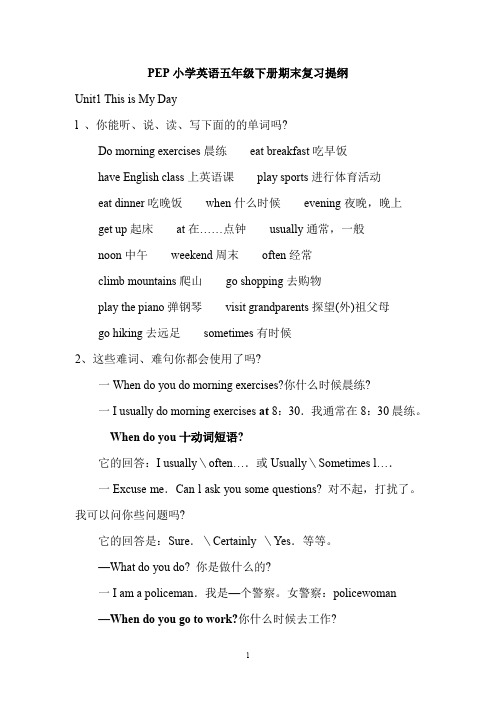
PEP小学英语五年级下册期末复习提纲Unit1 This is My Dayl 、你能听、说、读、写下面的的单词吗?Do morning exercises晨练eat breakfast吃早饭have English class上英语课play sports进行体育活动eat dinner吃晚饭when什么时候evening夜晚,晚上get up起床at在……点钟usually通常,一般noon中午weekend周末often经常climb mountains爬山go shopping去购物play the piano弹钢琴visit grandparents探望(外)祖父母go hiking去远足sometimes有时候2、这些难词、难句你都会使用了吗?一When do you do morning exercises?你什么时候晨练?一I usually do morning exercises at 8:30.我通常在8:30晨练。
When do you十动词短语?它的回答:I usually\often….或Usually\Sometimes l….一Excuse me.Can l ask you some questions? 对不起,打扰了。
我可以问你些问题吗?它的回答是:Sure.\Certainly \Yes.等等。
—What do you do? 你是做什么的?一I am a policeman.我是—个警察。
女警察:policewoman—When do you go to work?你什么时候去工作?Go to work:去工作go to school:上学go to bed:上床睡觉一I eat dinner at 7:00in the evening我晚上七点钟吃晚饭。
in the morning:在早上at noon在中午in the afternoon:在下午in the evening:在晚上一What do you do on the weekend? 你在周末做什么?What do you do on Mondays\Sundays…?你星期一/星期日……干什么?I(usually\often) … 或者:Usually \Sometimes I ….一How about you?=What about you? 你呢?Unit 2 My Favourite Season1你能听、说、读、写下面的的单词吗?spring春天summer夏天fall秋天winter冬天season季节which哪一个best最;极swim游泳fly kites放风筝skate滑冰;滑冰鞋make a snowman堆雪人plant trees植树why为什么because因为sleep睡觉2这些难词、难句你都会使用了吗?一What's your favourite season?你最喜欢哪个季节?一Winter.冬天。
PEP 小学五年级英语下册期末复习提纲

【人教版】小学PEP英语五年级下册第四单元知识点归纳

人教版小学PEP英语五年级下册知识点归纳二、用序数词表示具体的日期在英语中,“几月几日”可以先说“月”,再说“日”,其中“日”要用序数词,书写时序数词前可以有“the”,也可以没有。
但读日期时,the必须读出来。
如果要表示某年某月某日,通常按照“月、日、年”的顺序。
例如:March 3rd 读法是:March the third翻译是:3月3日。
June1st,2014 读法是:Junethe first, twothousand and fourteen翻译是:2014年6月1日。
三、基数词变序数词的口诀记忆基变序有规律,结尾加上th;一二三特殊记,结尾各是t,d,d;八减t九去e,f来把ve替;y改为ie,结尾仍有th;若是遇到几十几,只变个位就可以。
四、重点句型1、询问别人具体日期的句型及回答。
句型结构:问:When is+节日/活动?(···是哪天?)答:It’s on+月份+序数词。
·(··月···日)例:When is Children’s Day?(儿童节是哪天?)答:It’s on June 1st. (6月1日)2、询问生日的句型及回答句型结构:问:When is+某人的+birthday? (···生日是哪天?)答:It’s on+具体的日期。
例:问:When is your grandma’s birthday?(你奶奶的生日是哪天?)答:Her birthday is on June16th.(她的生日是6月16日。
)问:When is Miss White’sbirthday?(怀特小姐的生日是哪天?)答:It’s on July 1st. (7月1日。
)五、四会句子:When is April Fool’s Day ? 愚人节是哪天?It’s on April 1st . 它在4月1日。
(完整版)人教版PEP五年级下册英语知识点复习总结
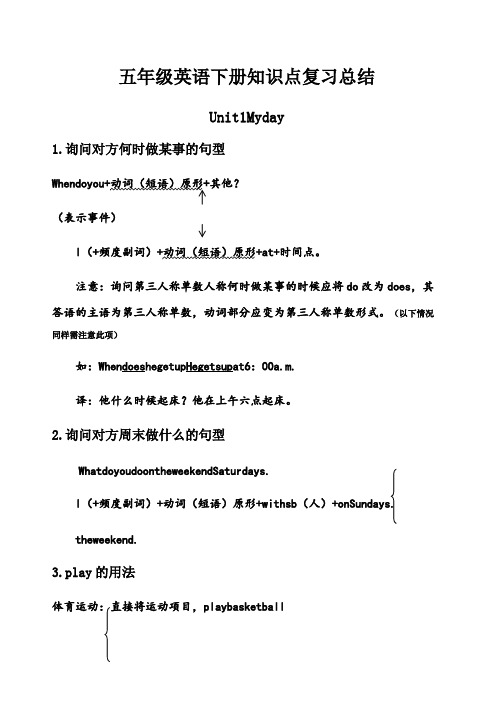
五年级英语下册知识点复习总结
Unit1Myday
1.询问对方何时做某事的句型
Whendoyou+动词(短语)原形+其他? (表示事件)
I(+频度副词)+动词(短语)原形+at+时间点。 注意:询问第三人称单数人称何时做某事的时候应将 do 改为 does,其 答语的主语为第三人称单数,动词部分应变为第三人称单数形式。(以下情况
同样需注意此项)
如:WhendoeshegetupHegetsupat6:00a.m. 译:他什么时候起床?他在上午六点起床。
2.询问对方周末做什么的句型
WhatdoyoudoontheweekendSaturdays. I(+频度副词)+动词(短语)原形+withsb(人)+onSundays. theweekend.
(2)在基数词后加 th:除去 first,second,third,其他基数词变序数词一般 直接在其后加 th。注意 five 与 twelve 要先把 ve 变 f,再加 th;eight 直接加 h;nine 去 e 再加 th。
(3)整十序数词以 ieth 结尾:整十位的序数词先将十位整数词尾的 y 变为 i, 再加 eth。如:twenty-twentieth。
The
注意:play-plays 因为 a 是元音 3)以 ch,sh,s,x 或 o 结尾的动词,在后面加-es; 例如 teach-teacheswash-washesdo-doesgo-goesfix-fixes
4)不规则的; 例如 have-has
5.by 的用法
人教版PEP五年级英语下册第三单元知识点、练习(含答案)

人教版PEP五年级英语下册第三单元知识点、练习(含答案)人教版PEP五年级英语下册第三单元知识点、练(含答案)Unit 3《My school calendar》要点知识【重点词汇】月份的单词:January(XXX.)一月February(Feb.)二月March(Mar.)三月April(Apr.)四月May五月June(Jun.)六月July(Jul.)七月August(Aug.)八月September (Sept.)九月October(Oct.)十月November(Nov.)十一月December(Dec.)十二月注意:1、月份的首字母一定要大写。
2、May没有缩写形式,September的缩写形式是“Sept.”,其他月份单词的缩写形式都是有单词的前三个字母加“·”构成。
3、月份的缩写形式不用在句子中,只能单独使用。
4、表示“在几月”时,要在月份单词前面加介词in,但在几月几日用on。
【常用节假日名称】New Year’s Day元旦(1.1)Tree Planting Day植树节(3.12)Easter复活节April Fool’s Day愚人节(4.1)May Day 劳动节(5.1)XXX母亲节(每年五月的第二个星期天)Children’s Day 儿童节(6.1)Father’s Day父亲节(每年六月的第三个星期天)Teachers’ Day教师节(9.10)China’s National Day国庆节(10.1)Mid-Autumn Day中秋节(阴历八月十五)Thanksgiving Day感恩节(11月第4个周四)Christmas圣诞节(12.25)summer vacation暑假winter vacation暑假【举动称号】sports XXX举动会Easterparty复生节集会school trip黉舍游览Chinesetest语文测试singingcontest歌颂竞赛birthday party华诞集会【要点语法】11.介词in、on、at的用法。
五年级下册英语人教版(PEP)第二单元知识点

2.你在夏天经常做什么? 我经常在夏天吃冰激凌。 What do you often do in summer? I often eat ice cream in summer. 3.你在秋天经常做什么? 我经常摘苹果。 What do you often do in autumn? I often pick apples. 4.你在冬天经常做什么? 我经常堆雪人。 What do you often do in winter? I often make a snowman.
2.你为什么喜欢夏天? 因为我喜欢暑假。 Why do you like summer? Because I like summer vacation. 3.你为什么喜欢秋天? 因为天气好,并且颜色漂亮。 Why do you like autumn? Because the weather is good and the colours are beautiful. 4.你为什么喜欢冬天?
因为我可以堆雪人。 Why do you like winter? Because I can问对方在某个季节经常做什么活动句型
句型结构: 问:What do you often do in+季节? 答:I often+活动+in+季节. 1.你在春天经常做什么? 我经常在春天种树。 What do you often do in spring? I often plant trees in spring.
Unit 2 My
favourite season
考点:
1.词汇:季节词汇 季节活动 2.询问对方最喜欢哪个季节句型 3.询问对方喜欢某个季节的原因 4.询问对方在某个季节经常做什么活动句型
PEP人教版五年级下册英语复习提纲
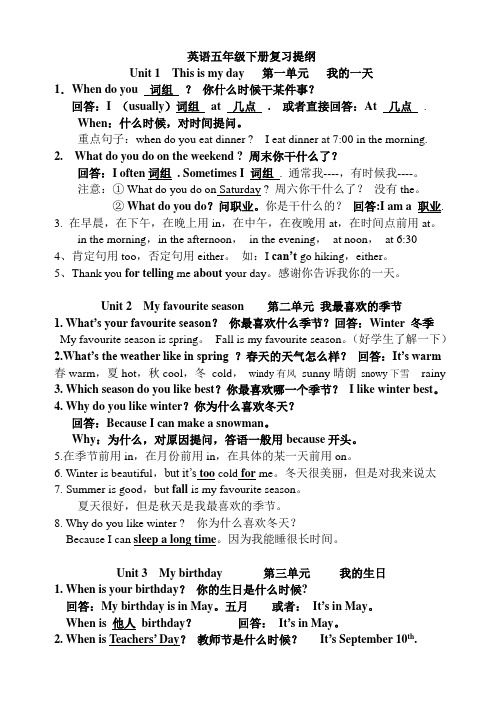
英语五年级下册复习提纲Unit 1 This is my day 第一单元我的一天1.When do you 词组?你什么时候干某件事?回答:I (usually)词组at 几点. 或者直接回答:At 几点.When:什么时候,对时间提问。
重点句子:when do you eat dinner ? I eat dinner at 7:00 in the morning. 2. What do you do on the weekend ? 周末你干什么了?回答:I often词组. Sometimes I 词组. 通常我----,有时候我----。
注意:① What do you do on Saturday ? 周六你干什么了?没有the。
②What do you do?问职业。
你是干什么的?回答:I am a 职业.3. 在早晨,在下午,在晚上用in,在中午,在夜晚用at,在时间点前用at。
in the morning,in the afternoon,in the evening,at noon,at 6:304、肯定句用too,否定句用either。
如:I can’t go hiking,either。
5、Thank you for telling me about your day。
感谢你告诉我你的一天。
Unit 2 My favourite season 第二单元我最喜欢的季节1. What’s your favourite season?你最喜欢什么季节?回答:Winter 冬季My favourite season is spring。
Fall is my favourite season。
(好学生了解一下)2.What’s the weather like in spring ?春天的天气怎么样?回答:It’s warm 春warm,夏hot,秋cool,冬cold,windy有风sunny晴朗snowy下雪rainy3. Which season do you like best?你最喜欢哪一个季节?I like winter best。
人教版PEP五年级英语(下册)复习提纲(超全)

一、重点词汇人教版 PEP 五年级英语(下册)知识要点第一单元eat breakfast 吃早餐have...class 上······课play sports 进行体育运动exercise 活动,运动do morning exercises 做早操eat dinner 吃晚饭clean my room 打扫我的房间go for a walk 散步go shopping 去购物take 学习,上(课)dancing 舞蹈take a dancing class 上舞蹈课a.m.上午 p.m.下午usually 通常地二、其他日常活动get up 起床eat lunch 吃午饭go to bed 上床睡觉wash my face 洗脸wash my clothes 洗我的衣服watch TV 看电视play ping-pong 打乒乓球play the pipa 弹琵琶goswimming 去游泳go running 去跑步do homework 做作业do kungfu 练武术play football踢足球play basketball 打篮球三、语音cl→ [cl] :clean clockclass cleverpl→[pl]:plate eggplantplease play注意:cl 和 pl 放在词尾与 e 结合变为 cle 和 ple 时发音不同。
四、频度副词always 总是,一直(100%) usually 通常(80%)often 经常(60%) sometimes 有时(30%)五、疑问词why 为什么w hen 什么时候六、重点句型1、询问别人什么时候做某事的句型及回答。
句型结构:问:When do you+动词短语原形+其他?(你/你们什么时候做某事?)答:I/we(+频度副词)+动词短语原形+at+具体时间. (我/我们通常在几点做某事。
- 1、下载文档前请自行甄别文档内容的完整性,平台不提供额外的编辑、内容补充、找答案等附加服务。
- 2、"仅部分预览"的文档,不可在线预览部分如存在完整性等问题,可反馈申请退款(可完整预览的文档不适用该条件!)。
- 3、如文档侵犯您的权益,请联系客服反馈,我们会尽快为您处理(人工客服工作时间:9:00-18:30)。
一、重点词汇人教版PEP 五年级英语(下册)知识要点第一单元eat breakfast 吃早餐have...class 上······课play sports 进行体育运动exercise 活动,运动do morning exercises 做早操eat dinner 吃晚饭clean my room 打扫我的房间go for a walk 散步go shopping 去购物take 学习,上(课)dancing 舞蹈take a dancing class 上舞蹈课a.m.上午p.m.下午usually 通常地二、其他日常活动get up 起床eat lunch 吃午饭go to bed 上床睡觉wash my face 洗脸wash my clothes 洗我的衣服watch TV 看电视play ping-pong 打乒乓球play the pipa 弹琵琶go swimming 去游泳go running 去跑步do homework 做作业do kungfu 练武术playfootball 踢足球play basketball 打篮球三、语音cl→ [cl] :clean clock class cleverpl→[pl]:plate eggplant please play注意:cl 和 pl 放在词尾与 e 结合变为 cle 和 ple 时发音不同。
四、频度副词always 总是,一直(100%) usually 通常(80%)often 经常(60%) sometimes 有时(30%)五、疑问词why 为什么when 什么时候六、重点句型1、询问别人什么时候做某事的句型及回答。
句型结构:问:When do you+动词短语原形+其他?(你/你们什么时候做某事?)答:I/we(+频度副词)+动词短语原形+at+具体时间. (我/我们通常在几点做某事。
)例:When do you go to bed?(你什么时候上床睡觉?)I go to bed at 9:00 p.m. (我晚上九点上床睡觉。
)注意:当主语是第三人称单数(he,she,it,单个人名或单数名词)时,助动词 do 要变成 does。
句型结构是:When does+主语(第三人称单数)+动词短语原形+其他?2、询问别人周末做什么的句型及回答。
句型结构:问:What do you do on the weekend?(你周末做什么?)答:I(+频度副词)+动词(短语)+其他。
例:What do you do on the weekend?(你周末做什么?)I usually read books. (我通常看书。
)注意:当主语是第三人称单数(he,she,it,单个人名或单数名词)时,助动词 do 要变成 does。
句型结构是:What does+主语(第三人称单数)+do+on the weekend第二单元一、重点词汇spring 春天summer 夏天autumn 秋天winter 冬天season 季节picnic 野餐go on a picnic 去野餐pick 摘pick apples 摘苹果 snowman 雪人make a snowman 堆雪人go swimming 去游泳which 哪一个best 最because 因为vacation 假期二、其他1、形容天气的形容词:hot 炎热的warm 暖和的rainy 多雨的windy 多风的 foggy 有雾的 cold 寒冷的cool 凉爽的sunny 晴朗的 cloudy 多云的snowy 下雪的2、由 go 构成的活动短语:go swimming 去游泳go shopping 去购物go boating 去划船go skating 去滑冰go hiking 去远足go fishing 去钓鱼三、语音br →[br]: brown library brother umbrellagr→ [gr] : green grapes grandpa grow四、重点句型1、询问别人天气怎么样的句型及回答。
句型结构:问:What’s the weather like+时间+地点?(······天气怎么样?)答:It’s+表示天气的形容词.例:What’s the weather like in winter in Beijing?(北京冬天的天气怎么样)It’s cold and windy(有风而且寒冷。
)2、询问别人最喜欢的季节句型及回答。
句型结构:问:Which season do you like best? (你最喜欢的季节是哪一个?)答:I like+季节+best. 或直接说季节名称。
同义句还有:What’s your favourite season?3、询问别人喜欢某个季节的原因的句型及回答。
句型结构:问:Why do you like+季节名称?或直接用“Why”来提问。
答:一般要用“because”引导的句子来说明理由,可以从天气相关的活动等方面来说。
例:(1)Why do you like spring?(你为什么喜欢春天?)Because I can go on a picnic.(因为我能去野餐。
)(2)Why do you like summer?(你为什么喜欢夏天?)Because I can go swimming.(因为我能去游泳。
)(3)Why do you like autumn?(你为什么喜欢秋天?)Because I can pick apples.(因为我能摘苹果。
)(4)Why do you like winter?(你为什么喜欢冬天?)Because I can make a snowman.(因为我能堆雪人。
)第三单元一重点词汇January 一月February 二月March 三月April 四月May 五月June 六月July 七月August 八月September 九月October 十月November 十一月December 十二月注意:1、月份的首字母一定要大写。
2、May 没有缩写形式,September 的缩写形式是“Sept”,其他月份单词的缩写形式都是由单词的前三个字母加“·”构成。
3、月份的缩写形式不用在句子中,只能单独使用。
4、表示“在几月”时,要在月份单词前面加介词 in。
二、常用节假日名称New Year’s Day 元旦(1.1)Tree Planting Day 植树节(3.12)Easter 复活节(每年春分月圆之后第一个星期日)April Fool’s Day 愚人节(4.1)May Day 劳动节(5.1)Mother’s Day 母亲节(五月第二个周日)Children’s Day 儿童节(6.1)Father’s Day 父亲节(六月第三个周日)Teacher’s Day 教师节(9.10)National Day 国庆节(10.1)Mid-Autumn Day 中秋节(农历八月十五)Thanksgiving Day 感恩节(11 月第 4 个周四)Christmas 圣诞节(12.25)summer vacation 暑假(July and August )winter vacation 寒假三、语音ch→ [ts]: China chicken lunch teachersh→[s]:sheep fish shirt shorts四、活动名称sports meet 运动会Easter party 复活节聚会school trip 学校旅行Chinese test 语文测试singing contest 歌咏比赛birthday party 生日聚会五、介词in 、on、at 的用法。
1、in +上午/下午/晚上/月份/季节/年份。
如:in the morning, in April, in winter, in 20152、on+具体的某一天。
如:on Monday, on April 3rd, on Friday morning3、at +具体的时间点或与其他词构成固定搭配。
如:at 6:00 , at noon六、重点句型1、问答某个活动或节日在几月份的句型及回答。
问:When is+ the +活动或节日名称?(注意:节日开头字母要大写)答:It’s in+月份.例:(1)When is the trip this year ? (今年的旅行在什么时候?)It’s in October. (在十月)(2)When is Christmas?(圣诞节在什么时候?)It’s in December.(在十二月。
)2、询问别人将要做什么的句型及回答。
问:What will you do+其他?答:I will...=I’ll...例:Wh a t w ill y o u d o f o r y o u r m u m o n M o t h e r’s Da y?(母亲节你将为你妈妈做什么?)I’ll give her some flowers.(我将送给她一些花。
)3、表达“我们将要···”的句型。
We’ll/We will + 动词原形. 这是一个一般将来时的句子,表示将来某个时间要发生的动作或事情。
例:We’ll have a school trip.(我们将有一次学校旅行。
)We’ll have a singing contest.(我们将有一次歌咏比赛。
)We’ll take a dancing class.(我们将要上一节舞蹈课。
)第四单元一、重点词汇first(1st) 第一 second (2nd)第二third (3rd)第三 fourth (4th)第四fifth(5th) 第五 sixth(6th) 第六seventh(7th)第七 eighth(8th)第八ninth(9th)第九 tenth(10th) 第十eleventh(11th)第十一twelfth(12th)第十二thirteenth(13th) 第十三fourteenth(14th) 第十四fifteenth(15th)第十五sixteenth(16th)第十六seventeenth(17th) 第十七eighteenth(18th) 第十八nineteenth(19th) 第十九twentieth(20th) 第二十twentieth-first(21th) 第二十一twentieth-second(22nd) 第二十二twentieth-third(23rd) 第二十三thirtieth(30th) 第三十二、用序数词表示具体的日期在英语中,“几月几日”可以先说“月”,再说“日”,其中“日”要用序数词。
